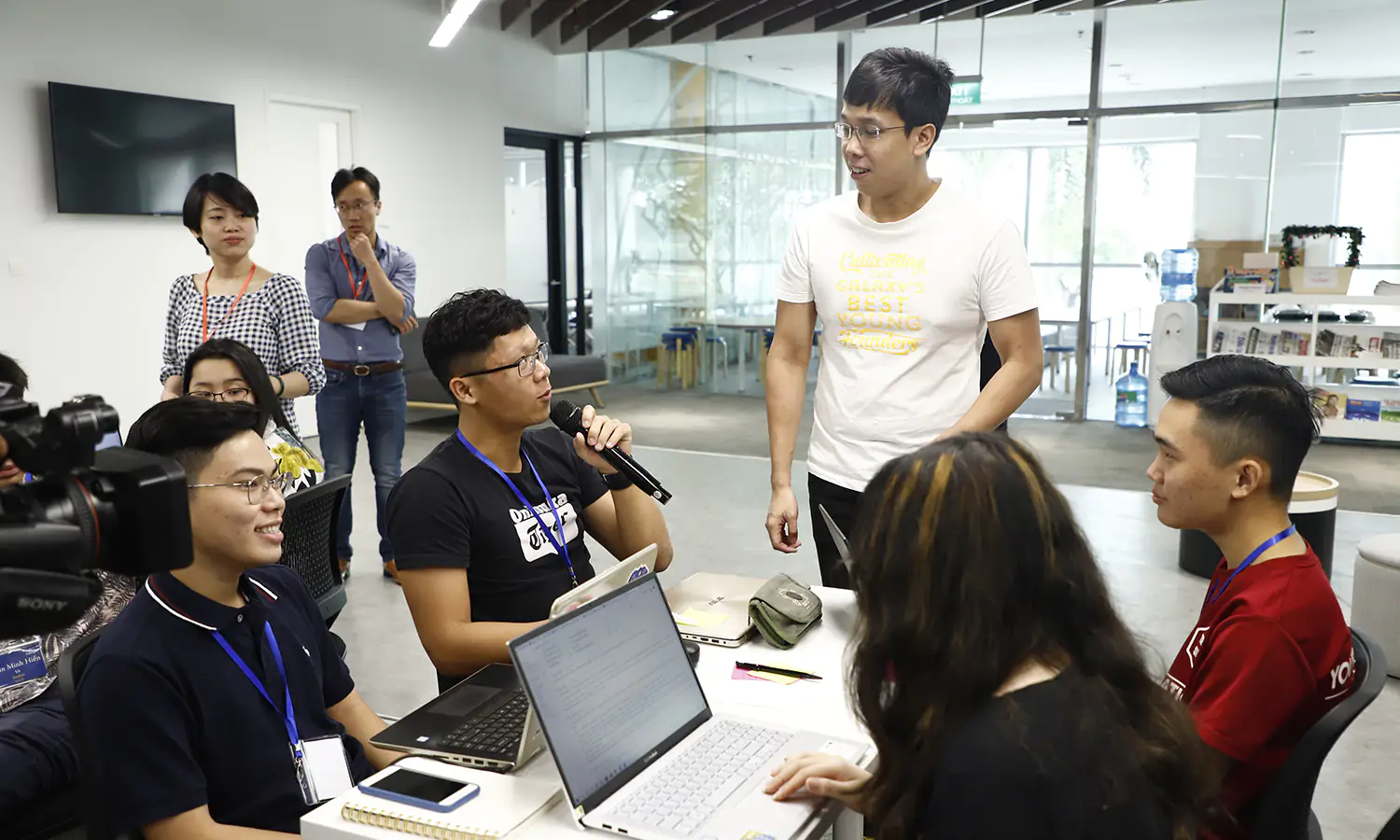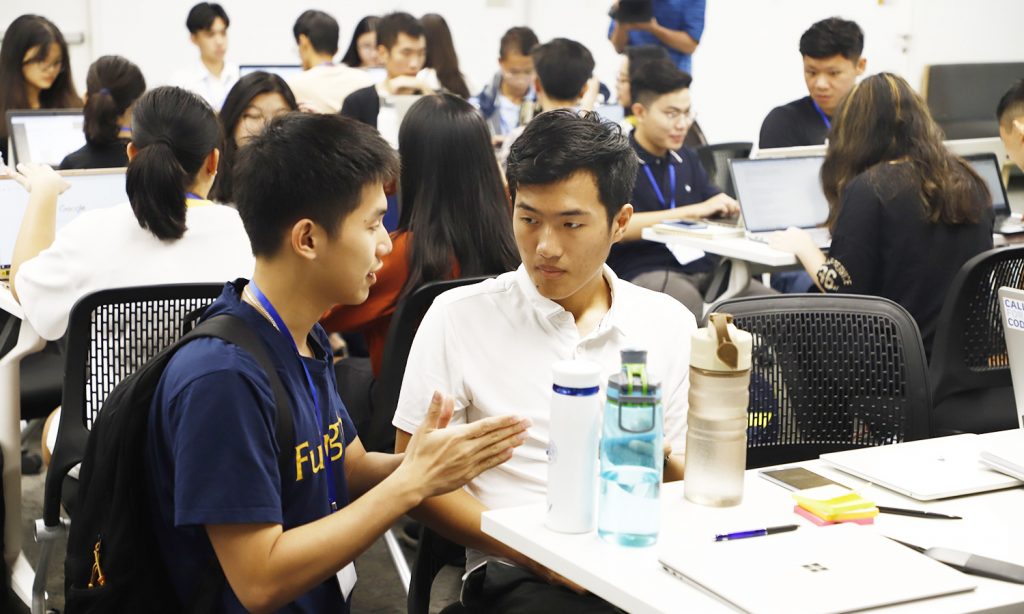
Entrepreneurship is a concept that is becoming more and more familiar with young people. It’s the talk of every town. I know there are many who consider it one of their goals, one they should achieve before the end of their youth. But as a freshman, I felt fuzzy about this. My friends also wondered, ‘students are still grappling with their schoolwork, so on what basis can they even start a business?’
But my mindset about entrepreneurship was totally changed after attending EntreCamp, co-organized by 3 partners: the Center for Entrepreneurship and Innovation (CEI) at Fulbright University Vietnam, Reactor School, a leading organization on startup education in Singapore, and Dinh Thien Ly Secondary School – High School. I was surprised to learn that Reactor School targets students from 13 to 24 years old. They believe that students should be exposed and familiarized early on to gain a better view of this fascinating game: “Entrepreneurship”.

Startups arise from social demands
In our first class at EntreCamp, we were taught that entrepreneurship ideas arise from problems and demands in society. To solve that problem, address that demand, a company is created. I wasn’t unfamiliar with this concept as I had read much on the topic of forming companies. Every successful company starts here. However, this experience was very different from reading a book, full of daydreams and admiration. EntreCamp gave me the opportunity to think about the social problems and needs I wanted to solve, and to seek out others with the same determination to create a business plan in just 3 days!!!
During the process of finding co-founders, I made many interesting discoveries. For starters, interacting with others who had wildly different ideas gave me a more multi-dimensional perspective on the world.
There was a boy who wanted to create a device that could monitor and alert parents if their children were being abused, or a girl who aspired to use education to raise awareness on the environment. EntreCamp was brimming with ideas and inspirations to make the world a better place. Those who shared these ideas could find each other and gather together to turn their beautiful visions into reality.

I found 3 friends who shared the same desire to mitigate the damage caused by CO2 on the environment. Although we had yet to find out if our concept was feasible, just standing together for an idea excited us.
“The starting point of a company is not money. Starting a business is a job that requires you sacrifice yourself for it. If you don’t have a burning passion for the problem you are trying to solve, money is not a good enough motivation to build such a company,” Coach Rusidy Khairul, CEO of Reactor School, told us. Those words became our guiding lights as we raced all around Fulbright to find each other.
Entrepreneurship isn’t easy
Just as the coaches explained, transitioning from idea to reality is a journey that is difficult from the very beginning. Our group was, and remains, concerned about the environment. We wanted to find a solution to the overwhelming increase in CO2 levels. With much excitement and enthusiasm, we envisioned a machine that filters CO2 and converts it into a product useful to humans. But when faced with the task of designing such a phenomenal machine, we found ourselves stuck.
The team realized there is no company currently capable of providing the technology necessary to build such a machine. What we were envisioning seemed to only exist in the Marvel Universe and require a genius like Tony Stark. That awareness caused the team’s morale to go down, partly because the idea was not viable, and also because the remaining time available in the program was too short to rework our idea or find a new one. However, we still sat together and encouraged each other, thinking ‘we should keep Googling, perhaps we missed something.’ The group spent the entire lunch break striving together to find a way to solve this puzzle.

As the team leader, I found the problem was too big for our group’s abilities. But I and my team are passionate about this problem. We were clearly determined to find a solution, so we braced ourselves to keep fighting. Then it suddenly struck us. We realized we could combine technologies from many different companies into one system to conceive the machine of our dreams. We were approaching a solution. We found the technology we needed for the project from three different companies – and the team’s morale soared higher than before.
At the start of the camp, the coach revealed he would invest SG$ 1,000,000 with the group that could pitch the most convincing idea to investors. Our group fantasized about receiving that seven-figure award, but in the toughest of times, that tempting reward ceased to be the driving force. Instead, the desire to solve a problem for society motivated us to overcome the biggest obstacles of the startup process. That afternoon taught me the most memorable lesson from EntreCamp, one that stayed with me to this day: If you don’t have a burning passion for the problem you are solving, money is not a good enough motivation for you to build the company.

Never stop learning
In the process of converting daydreams into an actual company, we received lots of support from our coaches. Rusidy Khairul was the main organizer, but he did not spend his time standing on a podium. Instead, he went to each group to observe closely and support everyone’s progress. The members of CEI and the teachers at Dinh Thien Ly school regularly checked in to encourage us; they provided strategic advice, listened attentively to each group’s problems, and assisted us in solving them. From their help, I realized how essential the role of a leader is to a startup team.
The rocky road to start a business does not simply require a group of young people to gather together. We had to unite and stand with one another. One of the exercises required us to go out and interview strangers on the street so we could receive feedback on our product. Many of us were shy, and just wanted to complete the assignment by… interviewing each other. But the coaches did not let our group get away with that “audacious” solution.
They encouraged us to be brave enough to do “whatever is needed” for our business idea. Help from mentors, whether financially, mentally, or in terms of experience, was certainly an important element essential to nurturing each group’s ideas.
One of the guest entrepreneurs at Entrecamp told us that starting a business is a game that looks glamorous to outsiders. But the players know how tough it is. That is a fact. Start-up is a challenge to any young person, and EntreCamp has given us, students that are yet to be 20, a chance to fully explore. EntreCamp posed extremely challenging requirements that made our experience with the program surreal.
From the very beginning, our coach made it clear there would be real investors coming to assess our business ideas, entrepreneurs who would seriously consider investing up to SG$ 1,000,000 in one of our ideas. EntreCamp was therefore no longer a class project, but a real game. Success would mean having your own company, not an A on your essay. Because of that, EntreCamp applied the same standards and requirements to teams that apply to startups in the business world: real business ideas with viable products and high commercial potential, backed by market research, as well as a clear and efficient business model with financial estimates year by year… We had to achieve all this in just three days.
I poured my heart and soul into the group’s business idea, dedicating all my time and attention to the final presentation so we could convince investors to back our business plan. Everywhere I looked walls seemed so tall they felt unreachable. It was so daunting that when I finally did it, it felt unrea.
At the same time, the startup process helped me realize the value of friendship. From four unacquainted people, we are now connected by a common passion. We shared a huge amount of work together, and uplifted each other to turn ideas into reality. These experiences, in my opinion, can only be acquired one of two ways: you either go out and take huge risks to start a business, or you join EntreCamp.

A self-development opportunity
In addition to valuable knowledge and experience in entrepreneurship, EntreCamp is also an opportunity for young people to meet entrepreneurs and investors, people who have been and are successful in the business world. Although we failed to secure investments, we still impressed and attracted the attention of three investors from Cambodia. They stayed to talk with the team after EntreCamp ended.
In this conversation, they shared, from experience, the myriad stories, emotions and sophisticated meanings contained in the two words: ‘start-up’. There has never been a more comfortable discussion, incredibly, than I’ve had with individuals I used to think were unreachable, too high up to ever meet. What they shared was invaluable to me, as it would be for any young people.
EntreCamp also opens new opportunities for us to develop ourselves. The investors told us they were impressed with young people like us, exchanged business cards to keep in touch, and thus became potential investors we could turn to if we eventually begin our start-up journey to build our own company.
At the end of the three-day EntreCamp, I felt I had just “grown up” a bit more. I learned that startups originate from social problems and are the human solution to those problems. We should not presume that the motivation for so many companies to form every year is just to make money.


EntreCamp helped me understand that it is possible to start a business, and what it means to do so while still in school. It also taught me what it demands, and how much there is to gain. By sharing an idea and daring to call for action, I realized I could find so much support, whether they be potential companions along the way or generous mentors to guide me through. The path of a start-up is not a bed of roses. It asks much of many individuals who must collaborate to work problems. But this is how we improve the world: by persisting together and leading each other to success.
Chềnh Hưng Phát – Class of 2023







